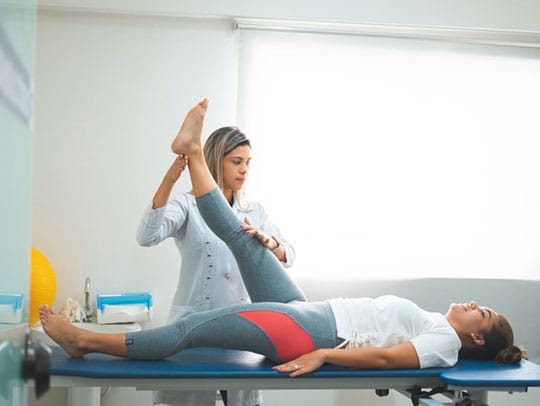
ACL reconstruction surgery
What is an ACL reconstruction?1
An ACL reconstruction is a surgery which replaces a torn ACL – or anterior cruciate ligament – with new ACL graft tissue — either taken from the patient's own body (tissue from the main patellar tendon or the hamstring) or donated from someone else (called an allograft).
The ACL is important in stabilising your knee during movement. When torn, your knee can collapse when making twisting or turning movements. Torn ACLs are often caused by contact sport or skiing injuries.
An ACL reconstruction is usually performed by an orthopaedic surgeon.
Skip straight to:
Public and private hospital options
It’s important to understand how getting your procedure in a public or private hospital differs.
| Question | Public system (Without health insurance) | Private system (With health insurance) |
|---|---|---|
| Will I avoid public hospital waiting lists? |
No. |
Yes. |
| Will I be able to choose my hospital? |
No. |
Yes. |
| Will I be able to choose my doctor or surgeon? |
No. |
Yes. |
| Will I have out-of-pocket costs? |
No. |
Yes. |
What’s covered in a public hospital?
In a public hospital, ACL reconstruction surgery is covered by Medicare for eligible residents.
Once you are discharged from hospital, you may still need to pay out-of-pocket for things like medicines and health services (like physiotherapy or occupational therapy).
What’s covered in a private hospital?
In a private hospital, private health insurance can cover some costs of ACL reconstruction surgery. You may have an out-of-pocket cost if you use private hospital cover when you get treatment.
You can minimise some of these costs by choosing a hospital and specialist that have agreements with your health insurer.
If you have an excess on your cover, you will have to pay for that out of pocket.
What is hospital excess?
Hospital excess is the amount of money you contribute upfront (out of your own pocket) before you can claim a benefit on hospital treatment. With HBF hospital cover, you choose an excess option when you first get hospital cover, but you can change your excess at any time.
With HBF, you only pay hospital excess once per person, per calendar year (to a maximum of twice on a family policy) when you’re admitted to hospital.
Are you an HBF member? You can check your excess in myHBF or the HBF App. This is the set amount you’ll pay when you’re admitted.
What is an out-of-pocket cost?
A hospital out-of-pocket cost is the portion of a hospital bill that you pay from your own pocket for which you won’t be reimbursed – by either health insurance or Medicare.
How to find health cover for ACL reconstruction surgery
If you want private health insurance cover for ACL reconstruction surgery, look for HBF hospital cover (not extras cover) that includes a category called ‘Joint reconstructions’.
You need to hold hospital cover that includes Joint reconstructions for two months before you can claim for an ACL reconstruction (or 12 months if you need an ACL reconstruction due to a pre-existing condition).
Ask your GP for an open referral
Your GP is the one who’ll most likely refer you to a specialist – but you may want the option to choose your own specialist.
Asking for an open referral can let you:
- Choose your own specialist.
- Find a specialist with good availability who can perform treatment at the hospital you prefer.
- Find a specialist that you trust to perform your surgery.
- Find a specialist with minimum out-of-pocket expenses for you.
Find an orthopaedic surgeon with minimum out-of-pocket costs
To find orthopaedic surgeons who have an agreement with HBF, just search for ‘orthopaedic surgeon’ in our find a provider tool.
- Look for the “Full Cover” tick mark or “Access Gap Cover” tick mark.
- These specialists will help minimise your out-of-pocket cost.
If you’ve already started working with a specialist
If you’ve already got a specialist, ask them these questions:
- Do you have a Full Cover or No Gap agreement with HBF?
If they don’t, you may need to consider if their fees work with your budget. - What hospital(s) do you operate in?
You can then check if the hospital has a Full Cover or No Gap agreement with HBF.

Signs you might need an ACL reconstruction2
Surgery is just one option for treating a torn ACL. Physiotherapy, wearing a knee brace, and other methods can also be very effective.
Reconstruction may be recommended for:
- Situations where your knee continually gives way after a tear.
- Combined injuries (ACL tears that occur along with other injuries in the knee, which is not uncommon.)
- Active adults involved in sports or jobs that require pivoting, turning, or hard-cutting, or who perform heavy manual work.

Alternatives to an
ACL reconstruction1
- Physiotherapy.
- Wearing a knee brace.

ACL reconstruction recovery1
Most patients leave hospital one day after an ACL reconstruction.
- For a few weeks following surgery, a knee brace and crutches are usually needed.
- It’s recommended that people don’t drive for a few weeks post surgery.
- Most people make a good recovery after an ACL reconstruction if they undertake intensive physiotherapy and do the recommended rehabilitation exercises.
- Regular exercise can aid recovery but must be done in line with healthcare provider advice.
- The knee is unlikely to return to pre-injury condition.
Looking for health insurance? Get a quote in minutes
Compare our hospital and extras cover options now. Or use our recommendation tool to select your needs and find our most affordable cover to suit.

Further reading


